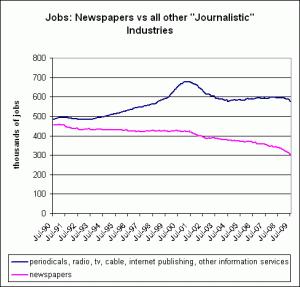Both combatants agree that putting paywalls in front of existing content is suicidal, although Carr believes that citizens will shell out once they realize that the alternative is cacophony. Masnick wins the award for best imagery: Paywalls are "putting up a tollbooth on a 50-lane highway where the other 49 lanes have no tollbooth," he writes. He sees no merit in paywalls whatsoever, while Carr believes they can work in some scenarios.
Carr suggests that micropayments should be looked upon "as payments for news applications instead." In fact, the Times' media columnist never suggests that charging readers for what they now get for free is a viable strategy. But since the status quo is no longer viable, shouldn't publishers experiment aggressively with hybrid models?
In the end, that's where the debaters end up. Both agree that blended paid and ad-supported models have the greatest chance of success. And if you re-read the first part of the two part series, you see that both basically suggested that approach at the outset. So maybe the "debate" was a bit of a fabrication to begin with, but at least it got our attention. And isn't that the goal after all?
Media Employment Trend Not All Bleak
 Over at BusinessWeek, Michael Mandel is looking at employment in US information industries. Using Bureau of Labor Statistics figures, he finds evidence that "someone is hiring out there," but it isn't newspapers, which have seen employment fall by about 40% since 1990. Mandel's analysis goes beyond newspaper employment to look at job trends in broadcast, Internet and "other information services." What's interesting is the growth in the "other" category. It's the only segment of the market that's above Internet bubble employment levels (although the actual numbers are quite small). Mandel promises more analysis in future posts.
Over at BusinessWeek, Michael Mandel is looking at employment in US information industries. Using Bureau of Labor Statistics figures, he finds evidence that "someone is hiring out there," but it isn't newspapers, which have seen employment fall by about 40% since 1990. Mandel's analysis goes beyond newspaper employment to look at job trends in broadcast, Internet and "other information services." What's interesting is the growth in the "other" category. It's the only segment of the market that's above Internet bubble employment levels (although the actual numbers are quite small). Mandel promises more analysis in future posts.
Jeff Jarvis takes issue with Mandel's whole premise, calling it "measuring the wrong economy: the old, centralized, big economy. In both cases, he misses new value elsewhere in the small economy of entrepreneurs and the noneconomy of volunteers." In Jarvis's view, media isn't dying so much as restructuring itself in a "post-industry" model characterized by vastly more efficient means of production, a distributed workforce and a decentralized approach to nearly everything. Innovation hasn't left the building, he says, it has merely left the buildings where priesthoods dwell. To see the new media economy taking shape, you have to look at Wikipedia and eBay for guidance, not The New York Times and Macy's.
http://www.newspaperdeathwatch.com/on-paywall-issue-combatants-basically-agree.html




No comments:
Post a Comment